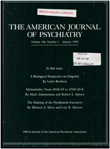Dexamethasone suppression in dementia, depression, and normal aging
Abstract
Dexamethasone suppression tests (DSTs) were performed for 18 moderately demented elderly patients, 66 depressed elderly outpatients, and 25 age- and sex-matched healthy elderly control subjects. Seventeen percent of the demented patients and 4% of the normal subjects were DST nonsuppressors, compared to 38% of the total depressed group. The postdexamethasone plasma cortisol levels of the dementia group fell between those of the normal and the depressed subjects. In addition, demented patients had postdexamethasone cortisol levels significantly lower than those of depressed patients with high Hamilton depression scores. Older subjects in all diagnostic categories, including normal subjects, had higher postdexamethasone plasma cortisol levels.
Access content
To read the fulltext, please use one of the options below to sign in or purchase access.- Personal login
- Institutional Login
- Sign in via OpenAthens
- Register for access
-
Please login/register if you wish to pair your device and check access availability.
Not a subscriber?
PsychiatryOnline subscription options offer access to the DSM-5 library, books, journals, CME, and patient resources. This all-in-one virtual library provides psychiatrists and mental health professionals with key resources for diagnosis, treatment, research, and professional development.
Need more help? PsychiatryOnline Customer Service may be reached by emailing [email protected] or by calling 800-368-5777 (in the U.S.) or 703-907-7322 (outside the U.S.).



